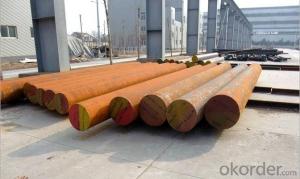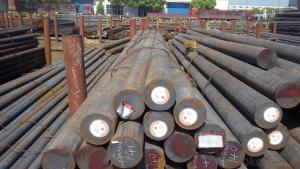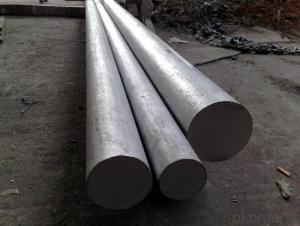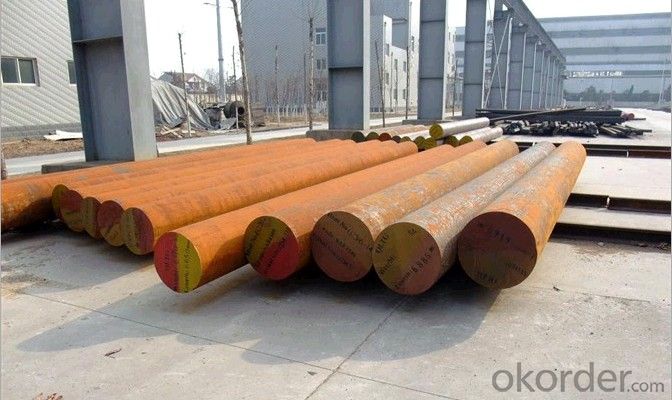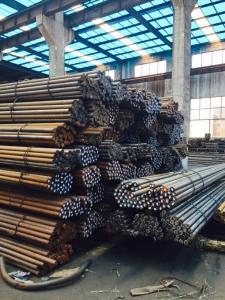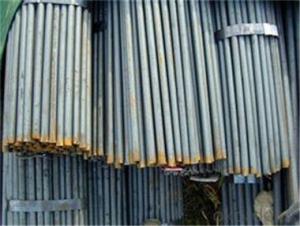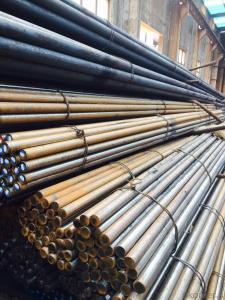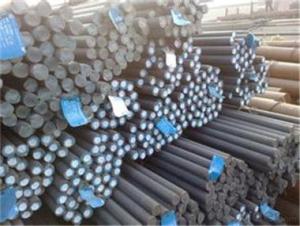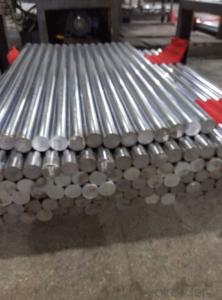Forged C45 Carbon Steel Round Bars Steel Bar
- Loading Port:
- China main port
- Payment Terms:
- TT OR LC
- Min Order Qty:
- 30 m.t.
- Supply Capability:
- 10000 m.t./month
OKorder Service Pledge
OKorder Financial Service
You Might Also Like
Specification
Forged C45 Carbon Steel Round Bars Steel Bar
Product Information:
Stock available in annealed and QT condition.
No MOQ for order.
Delivery 7-10 days.
Good tolerance according the the OD.
Staightness could meet 1mm/M per requirement.
Detailed Information:
1, Standard: GB, ASTM, AISI, SAE, DIN, JIS, EN
2, Produce Process: smelt iron - EAF smelt billet - ESR smelt billet - hot rolled or forged to get the steel round bar and plate
3, Heat Treatment: annealing, normalizing, tempering, quenching
4, Surface Treatment: Black, Polished, Galvanized
The picture of the products
5, Quality Assurance: We accept third party inspection for all orders.
You can ask testing organizations such as SGS, BV, etc. to test our products before shipping.
Product Overviews:
| Product Name | Typical Grades | Diameter(mm) | Standard adopted |
| Carbon Steel | 20 (1020/S20C/C22) | Ø16-Ø300 | GB/SAE/JIS/DIN |
| 40 (1040/S40C/C40) | |||
| 45 (1045/S45C/C45) | |||
| Bearing Steel | GCr9 (51100/SUJ1) | Ø12-Ø250 | |
| GCr15 (52100/SUJ2/100Gr6) | |||
| GCr9SiMn (A485-Gr.1/SUJ3) | |||
| Cr-Mo Steel | 20Cr (5120/SCr420H/20Cr4) | Ø12-Ø250 | |
| 40Cr (5140/SCr440/41Cr4) | |||
| 42CrMo(4140/SCM440/42CrMo4) | |||
| Gear Steel | 20CrNiMo | Ø16-Ø600 | |
| 20CrMn(5115/SMnC420/20MnCr5) | |||
| 20CrNiMo(8620/SNCM220/20CrMiMo2) |
Product Show:

Our Advantages:
· Industry experience over 20 years.
· Shipment of goods -More than 70 countries worldwide.
· The most convenient transport and prompt delivery.
· Competitive price with best service.
· High technical production line with top quality products.
· High reputation based on best quality products.
With our experienced, enthusiastic and dynamic staffs, we assure to bring you the products with best quality, reasonable prices and good after-sales services under the motto: Friends First, Business After.
Communication, Experience, Expertise and Best efforts are our Promises to you.
- Q: What are the main applications of special steel in the packaging machinery?
- Special steel is widely used in packaging machinery due to its outstanding properties such as high strength, corrosion resistance, and durability. It is primarily utilized in the construction of machine components like blades, dies, and molds, ensuring efficient and precise cutting, shaping, and forming of packaging materials. Additionally, special steel's ability to withstand high temperatures and extreme pressures make it suitable for applications requiring heat sealing or sterilization of packaging. Overall, special steel plays a crucial role in enhancing the performance, reliability, and longevity of packaging machinery.
- Q: How does special steel compare to other materials?
- Special steel, known as alloy steel as well, possesses outstanding strength, durability, and resistance to wear and corrosion. When compared to regular steel, aluminum, and plastic, special steel stands out due to its superior mechanical properties. To begin with, special steel offers higher tensile strength and hardness, making it perfect for applications that require heavy-duty performance. Its ability to withstand high pressures and temperatures, as well as resistance to deformation, make it suitable for industries like aerospace, automotive, and construction. Furthermore, special steel has excellent wear resistance, making it suitable for applications that endure friction, abrasion, and impact. This characteristic reduces the need for frequent repairs or replacements, resulting in cost savings and improved efficiency. When it comes to corrosion resistance, special steel surpasses regular steel, which tends to rust when exposed to moisture or aggressive environments. The presence of elements like chromium, nickel, and molybdenum in its composition creates a protective layer on the surface, preventing corrosion and extending the lifespan of the material. Compared to materials like aluminum and plastic, special steel has the advantage of being more robust and less prone to deformation or breakage. While aluminum is lightweight, it lacks the strength and hardness of special steel, limiting its suitability for heavy-duty applications. On the other hand, plastic offers lower strength and durability compared to special steel, making it less appropriate for demanding tasks. Moreover, special steel can be easily machined, fabricated, and welded, allowing for versatile applications across various industries. Its flexibility in terms of shaping and forming makes it the preferred choice in the manufacturing of components and structures. In conclusion, special steel outperforms other materials in terms of strength, durability, wear resistance, corrosion resistance, and versatility. Its exceptional properties make it an essential material in demanding industries where reliability and performance are of utmost importance.
- Q: How does special steel perform in low-temperature environments?
- Special steel, otherwise known as low-temperature steel, has been specifically designed to excel in environments with low temperatures. One of the main advantages of special steel is its exceptional ability to maintain its strength and toughness, even in extremely cold conditions. This is particularly crucial in industries like oil and gas, where equipment and structures are constantly exposed to extreme cold. When regular steel is subjected to low temperatures, it tends to become brittle and lose its mechanical properties, making it susceptible to cracking and failure. However, special steel is formulated with specific alloying elements such as nickel, chromium, and molybdenum, which enhance its performance in low-temperature scenarios. These alloying elements work to prevent the formation of brittle phases, allowing the steel to retain its toughness and ductility, even at sub-zero temperatures. Special steel finds extensive usage in cryogenic applications, where temperatures can plummet as low as -196 degrees Celsius (-320 degrees Fahrenheit). It is commonly employed in the construction of cryogenic storage tanks, liquefied natural gas (LNG) carriers, and other components that come into contact with extremely cold fluids or gases. In low-temperature environments, special steel not only maintains its mechanical properties but also exhibits remarkable resistance against corrosion. This is particularly crucial since low temperatures can exacerbate corrosion issues in many materials. The high nickel content present in special steel contributes to its corrosion resistance by forming a protective oxide layer that prevents the steel from corroding, even in harsh conditions. Overall, special steel has been purposefully engineered to withstand the challenges presented by low-temperature environments. Its ability to preserve strength, toughness, and corrosion resistance makes it an ideal choice for various industries that operate in extreme cold conditions.
- Q: How does special steel perform in magnetic applications?
- Special steel performs well in magnetic applications due to its high magnetic permeability and low electrical conductivity. This allows it to efficiently conduct and concentrate magnetic fields, making it ideal for various magnetic devices and applications such as transformers, motors, generators, and magnetic sensors. Additionally, special steel can exhibit excellent magnetic properties such as high saturation magnetization and low coercivity, making it capable of generating strong magnetic fields and maintaining magnetization even in challenging conditions.
- Q: How is special steel used in the textile supply chain?
- Special steel is used in the textile supply chain for various applications such as manufacturing textile machinery, equipment, and tools. The high strength and durability of special steel make it ideal for creating components that can withstand the demanding conditions of textile production, including high temperatures, corrosion, and heavy loads. It is commonly used in the production of spinning machines, looms, needles, and other crucial parts, ensuring efficient and reliable textile manufacturing processes.
- Q: How does special steel perform in high-temperature creep resistance?
- Special steel has excellent performance in high-temperature creep resistance. It is specifically designed to withstand prolonged exposure to elevated temperatures without undergoing excessive deformation. This is achieved through the addition of alloying elements and a careful heat treatment process, which help to enhance the steel's strength, stability, and resistance to creep. Special steel's superior creep resistance makes it a reliable choice for applications that involve high temperatures and long-term stress, ensuring the structural integrity and durability of the material.
- Q: What are the challenges in surface treating special steel?
- Surface treating special steel can present a range of challenges due to the unique properties and composition of the material. Some of the main challenges include: 1. Hardness: Special steels often have a high level of hardness, making it difficult to achieve effective surface treatment. Traditional methods like heat treatment or chemical processes may not be sufficient to alter the surface properties without affecting the core strength. 2. Surface contamination: Special steels are susceptible to contamination during the surface treatment process. Even small traces of impurities or foreign materials can compromise the integrity of the treated surface. It is crucial to have a controlled environment and use clean equipment to minimize contamination risks. 3. Complex alloy composition: Special steels are typically alloyed with various elements to enhance their specific characteristics, such as corrosion resistance or high temperature stability. This complex composition can make it challenging to find suitable surface treatment techniques that can effectively modify the surface properties without negatively impacting the alloy's overall performance. 4. Adhesion and coating uniformity: Achieving good adhesion and coating uniformity on special steel surfaces can be problematic. The surface characteristics and microstructure of special steels can make it challenging for coatings or treatments to adhere properly and evenly. Special attention must be given to surface preparation and the selection of appropriate primers or coatings to ensure good adhesion and uniformity. 5. Heat sensitivity: Some special steels may be sensitive to heat during surface treatment processes. Excessive heat exposure can alter the material's properties, leading to structural changes or even deformation. Careful temperature control and suitable cooling methods need to be employed to prevent any undesirable effects on the steel during the surface treatment process. 6. Cost: Surface treating special steel can be a costly process due to the specialized equipment, materials, and expertise required. Additionally, the challenges mentioned above can increase the complexity and time required for surface treatment, leading to higher costs. It is essential to consider these factors when planning and budgeting for surface treatment on special steel components.
- Q: What are the specific requirements for special steel used in the nuclear industry?
- The specific requirements for special steel used in the nuclear industry include high strength and toughness, excellent corrosion resistance, low susceptibility to stress corrosion cracking, and resistance to radiation damage. These steels must also have good weldability and the ability to maintain their mechanical properties under extreme conditions, such as high temperatures and pressures. Additionally, they need to meet strict quality control standards and undergo rigorous testing and certification procedures to ensure their suitability for use in nuclear power plants.
- Q: How does special steel perform in cryogenic corrosion resistance?
- Special steels are known for their excellent performance in cryogenic corrosion resistance. When exposed to extremely low temperatures, such as those encountered in cryogenic applications, regular steels tend to become brittle and susceptible to corrosion. However, special steels are specifically designed to withstand these conditions and maintain their mechanical properties and corrosion resistance. The performance of special steels in cryogenic environments is mainly attributed to their composition and microstructure. These steels are typically alloyed with elements such as nickel, molybdenum, and nitrogen, which enhance their resistance to corrosion at low temperatures. Additionally, the microstructure of special steels is carefully controlled, resulting in a fine grain size and homogeneous distribution of alloying elements. This microstructure contributes to the steel's ability to resist corrosion and maintain its mechanical strength even at cryogenic temperatures. Furthermore, special steels undergo rigorous testing to ensure their suitability for cryogenic applications. They are subjected to low-temperature impact tests, which assess their toughness and resistance to brittle fracture. These tests verify that the steel can withstand the stresses and strains imposed by cryogenic conditions without failure. Overall, special steels exhibit excellent cryogenic corrosion resistance due to their unique composition, microstructure, and thorough testing. They are a preferred choice for applications that require reliable performance at extremely low temperatures, such as in the aerospace, energy, and scientific research industries.
- Q: How does special steel contribute to the manufacturing of cutting blades for industrial machines?
- Due to its unique properties and composition, special steel plays a vital role in the production of cutting blades for industrial machines. The exceptional hardness of special steel is crucial for cutting blades to withstand the high pressure and abrasion experienced during industrial cutting operations. This hardness ensures that the blades remain sharp for extended periods, reducing the need for frequent replacement and minimizing downtime in manufacturing processes. In addition, special steel offers remarkable toughness, enabling cutting blades to endure heavy loads without chipping or breaking. This is especially important in industrial settings where cutting blades face intense forces and must maintain their integrity to ensure efficient and reliable cutting operations. Furthermore, special steel exhibits excellent resistance to corrosion and wear, making it an ideal material for cutting blades used in harsh environments involving chemicals, extreme temperatures, or abrasive materials. This corrosion resistance prolongs the lifespan of the cutting blades, reducing maintenance costs and improving overall productivity. Moreover, special steel can be customized to meet specific requirements, allowing for the manufacturing of cutting blades with precise dimensions, shapes, and cutting angles. This customization ensures that the blades are tailored to the unique needs of different industrial machines and applications, optimizing cutting performance and efficiency. In conclusion, special steel greatly contributes to the manufacturing of cutting blades for industrial machines by providing outstanding hardness, toughness, corrosion resistance, and customization options. These properties enhance the durability, reliability, and efficiency of cutting operations, ultimately leading to improved productivity and reduced costs in industrial manufacturing processes.
Send your message to us
Forged C45 Carbon Steel Round Bars Steel Bar
- Loading Port:
- China main port
- Payment Terms:
- TT OR LC
- Min Order Qty:
- 30 m.t.
- Supply Capability:
- 10000 m.t./month
OKorder Service Pledge
OKorder Financial Service
Similar products
Hot products
Hot Searches
Related keywords
